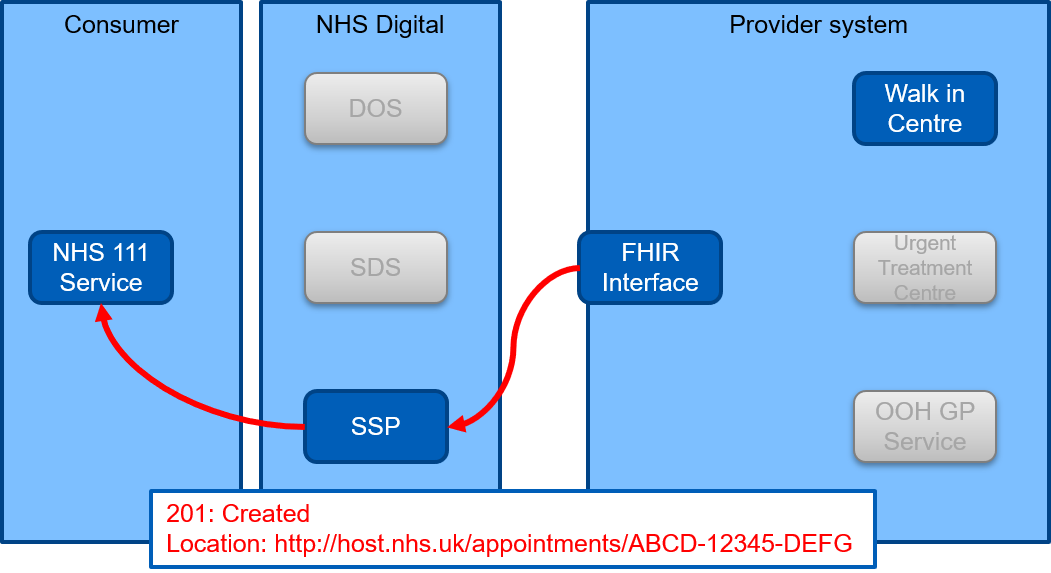Introduction
This section describes the message interactions that happen as part of the main booking workflow. It will define the key parameters and attributes required to progress through the booking flow.
Below is the primary data model that describes the key data items that are required.
Primary Data Model
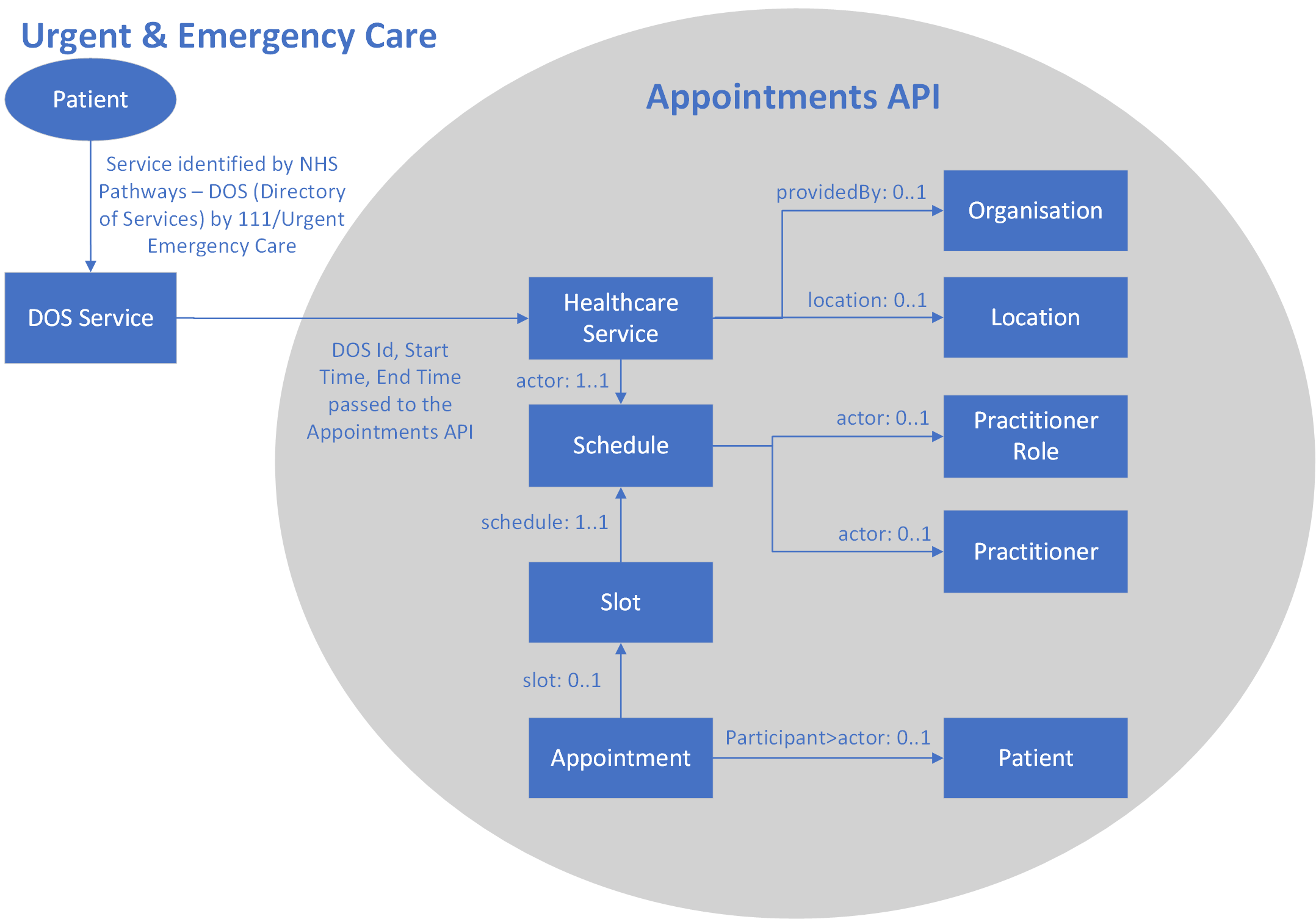
The sections below will step through the process.
The Actors
There are a number of different systems involved in the end to end booking process. These fall into the following catagories:
- Consumer System
- National Infrastructure
- Provider System
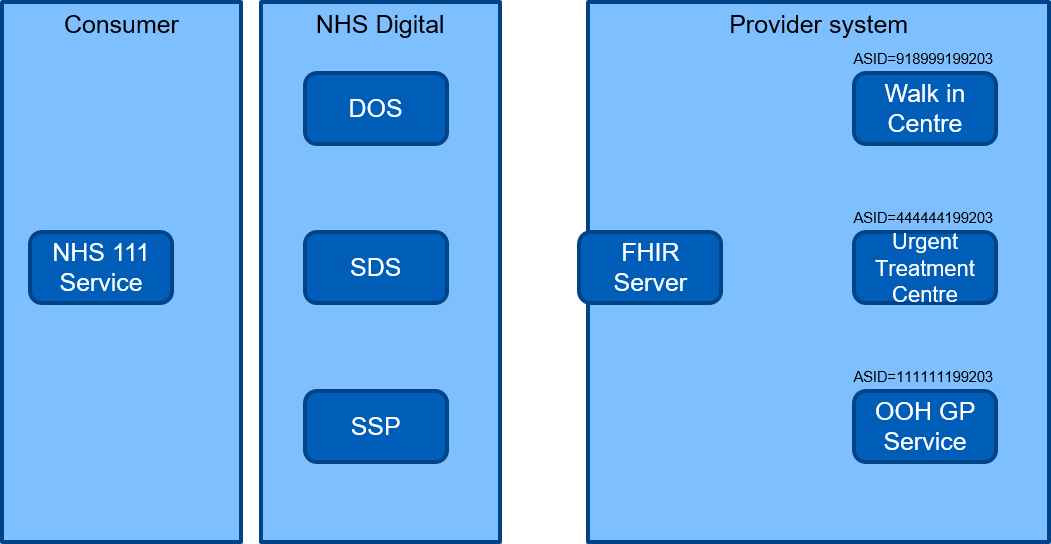
Consumers
The consuming system belongs to the service that is searching for an appropriate appointment for the patient. The system will participate in discovery of the appropriate service, discovery of its booking endpoint, searching the providing system for appropriate slots and then booking one of those slots for the patient. There are many examples of services that could be fullfilling this role for example NHS111, IUC Clinical Hub, A&E or even a GP Service.
National Infrastructure
During the booking provess a number of systems that are hosted by NHS Digital as national infrastructure need to be interacted with. These are as follows:
Patient Demographic Service (PDS)
The Patient Demographic Service is a Spine service that enables matching captured demographics against a national demographic repository. PDS verified demographics, in particular NHS number is required by a lot of interoperability in the NHS. A spine verified NHS number, either by direct verification on PDS or through a Spine Mini Service Provider (SMSP) is required for booking using this standard.
National DoS
The national DoS can be used to discover the most appropriate service for the patient. If that service offers appointments the necessary information required to query SDS for the endpoint will be provided.
Spine Directory Service (SDS)
The SDS performs the role of the booking endpoint directory. Endpoints for the booking API of target provider systems will be registered on the SDS as part of assurance.
NHS Identity (Strategic Authentication)
The NHS Identity service provides a digital identity that consumed many times from a single logon. It can also be linked with every day devices to provide extra contextual information about that user (e.g. location, nearby services) and it can profile the characteristics of the owner(usual times of sign-on, services normally used, location, devices linked to the user).
For this booking standard, NHS Identity validates credentials passed by the consuming system, and subject to this check, issues a short lived (1 hour) access token which the consuming system must include in a http Authorization header in all requests to the provider system.
Spine Secure Proxy (SSP)
The SSP brokers and routes connections to endpoints. In order to facilitate urgent appointment booking it is important to support the ability to establish connections between systems on-the-fly without prior networking or security configuration between two specific systems. In order to do this all communications between systems are brokered via the SSP. That way systems involved in booking only ever need to establish and accept connections from/to the SSP which can be configured once, as part of assurance
Provider Systems
The provider system is the system that is offering appointments to be booked into. This system will be configured to accept connections from the SSP and will offer the defined capabilities in this standard via its FHIR Interface. There are many different service types that could be a booking provider including UTC’s, OOH GP’s, Emergency Dental services etc..
Service Discovery
The first step of the booking process involves some form of service discovery. Typically this will use the Urgent Care Directory of Services (known as the “DoS”) to identify the most appropriate service to meet the patients needs.
In the situation the DoS is being used there will be the initial call to the DoS API to return the ordered list of appropriate services (CheckCapacitySummary).
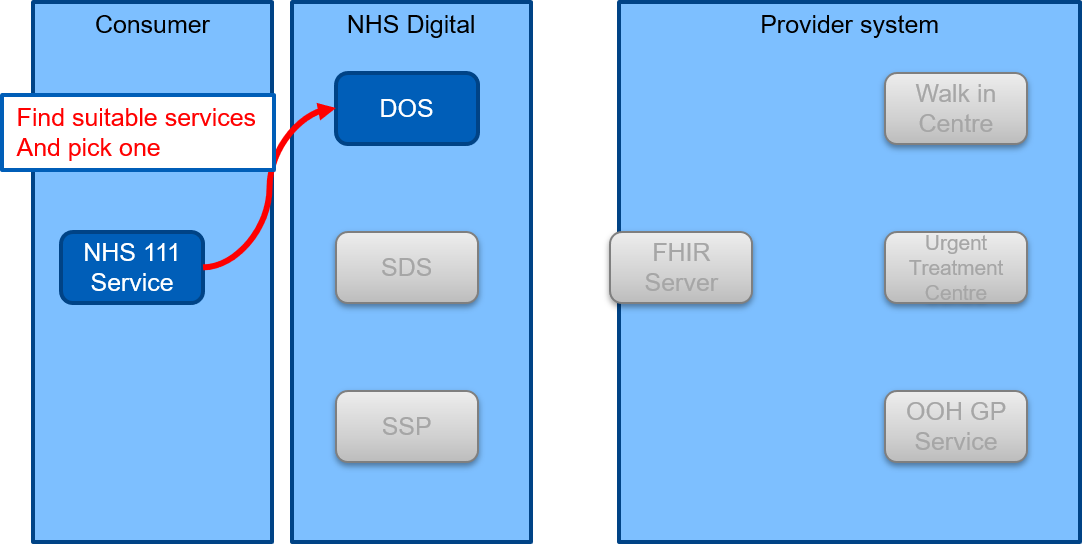
Once the chosen service has been selected the next call to the DoS API is made (ServiceDetailsByID) and this will return the specific details of the selected service including something called an Accredited System Identifier (ASID).
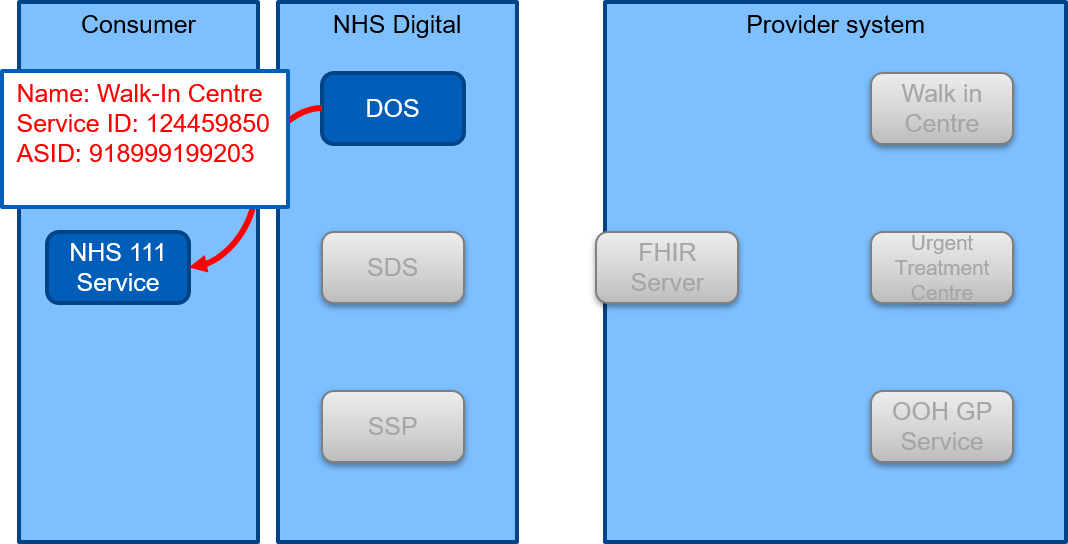
An ASID is used to obtain the endpoint for booking into the Provider system.
Endpoint Discovery
The consuming system uses SDS to resolve the FHIR Endpoint Server Root URL. SDS is queried using the ASID obtained from the previous step.
This is a two step process:
- Obtaining the nhsAS object that contains an MHS Party Key.
- Obtaining the nhsMHS object that contains an nhsMHSEndPoint.
Step 1:
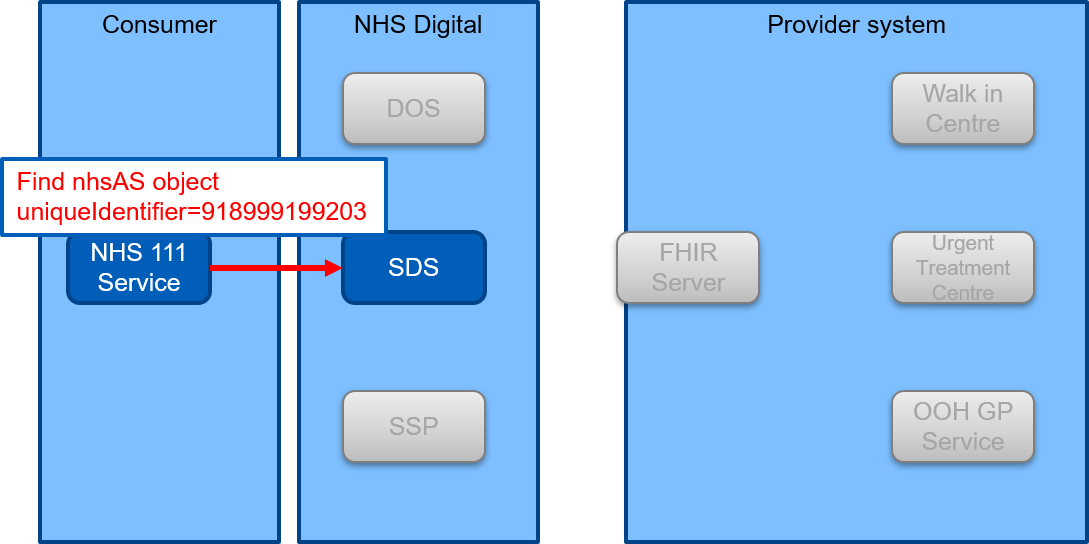
Given an ASID of 123456789012 a query can be made to obtain the nhsMHSPartyKey of the nhsAS object, for example:
ldapsearch -b uniqueIdentifier=123456789012,ou=Services,o=nhs nhsMHSPartyKey
Response:
nhsMHSPartyKey: A12345-1234567
The value returned is needed for step 2:
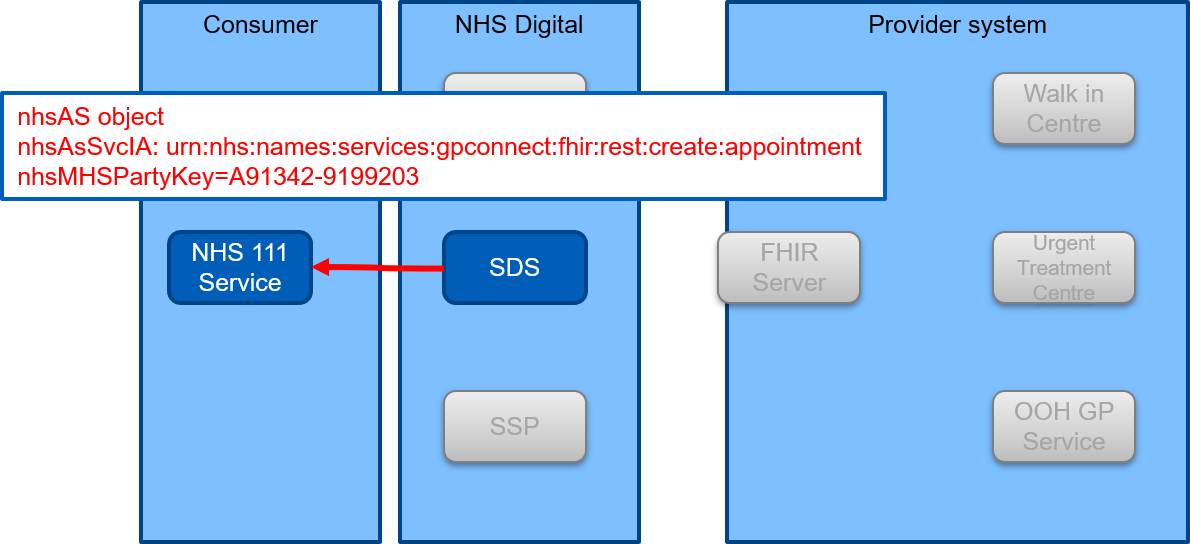
Step 2: A request for the nhsMHS object can then be made using the interaction and Party Key:
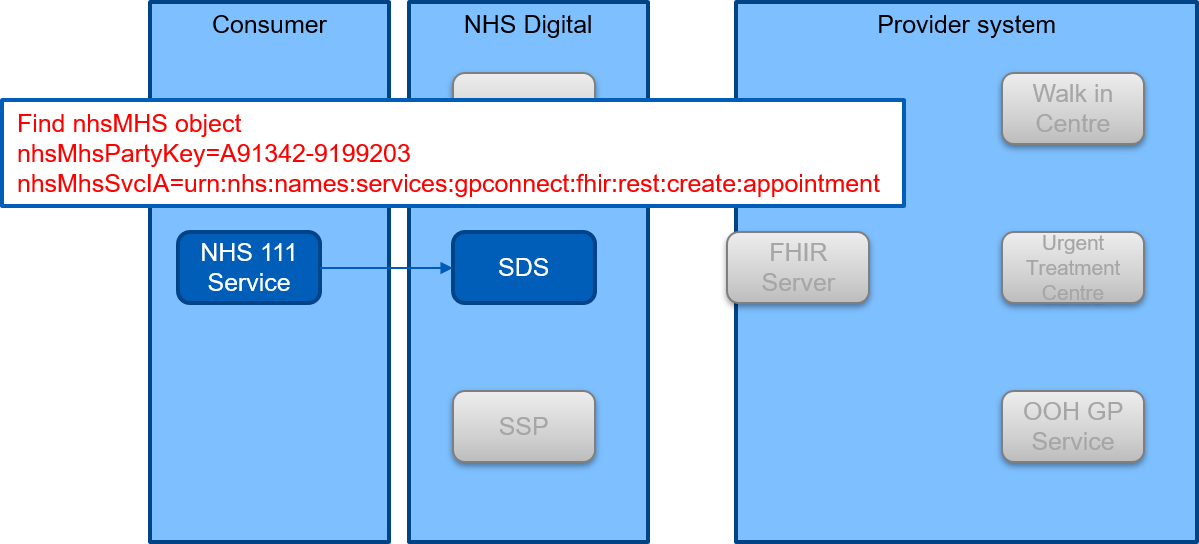
ldapsearch -b ou=Services,o=nhs "(&(nhsMHSPartyKey= A12345-1234567)(nhsMhsSvcIA=urn:nhs:names:services:gpconnect:fhir:rest:create:appointment))" nhsMHSEndPoint
Response:
nhsMHSEndPoint: https://server.domain.nhs.uk/fhir_base
The value returned is the endpoint required to build an SSP request.
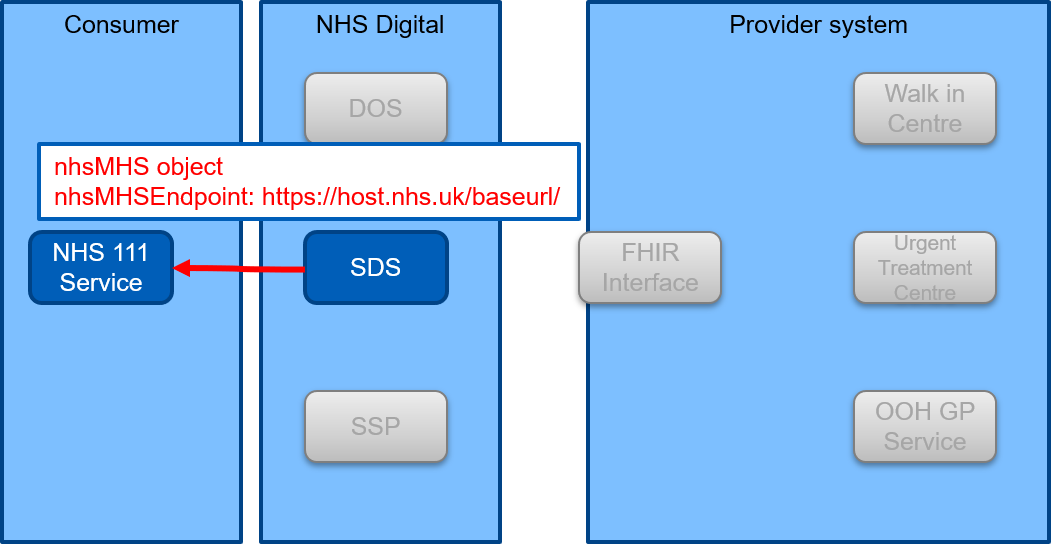
Before making a call to the FHIR endpoint, the consuming system needs to obtain an access token from NHS identity. This uses an OAuth Client Credentials grant making a call to the token endpoint of NHS Identity, including the following values:
grant_type=client_credentials
client_id=[issued during assurance].
client_secret=[issued during assurance].
scope=[Not yet finalised, see below]
We’ve yet to finalise the set of scopes that the client is asking for, but it’ll be as a minimum:
- appointment/*.write
- slot/*.read
- schedule/*.read
- location/*.read
- organization/*.read
- healthcareservice/*.read
Assuming the credentials match, and the consuming system is authorised to search for slots and book appointments (i.e. it’s allowed the scopes it’s asking for), then NHS Identity returns an access token encoded as a JWT (see https://developer.nhs.uk/apis/spine-core/security_jwt.html).
This access token is then passed in the Authorization http header in all calls to a provider system.
Get Slots
The first request to the SSP will be to get available slots. The request returns the slot resource from the target service. the request URL has three parts:
- The SSP proxy URL
- FHIR endpoint server root URL
- FHIR resource location and request parameters
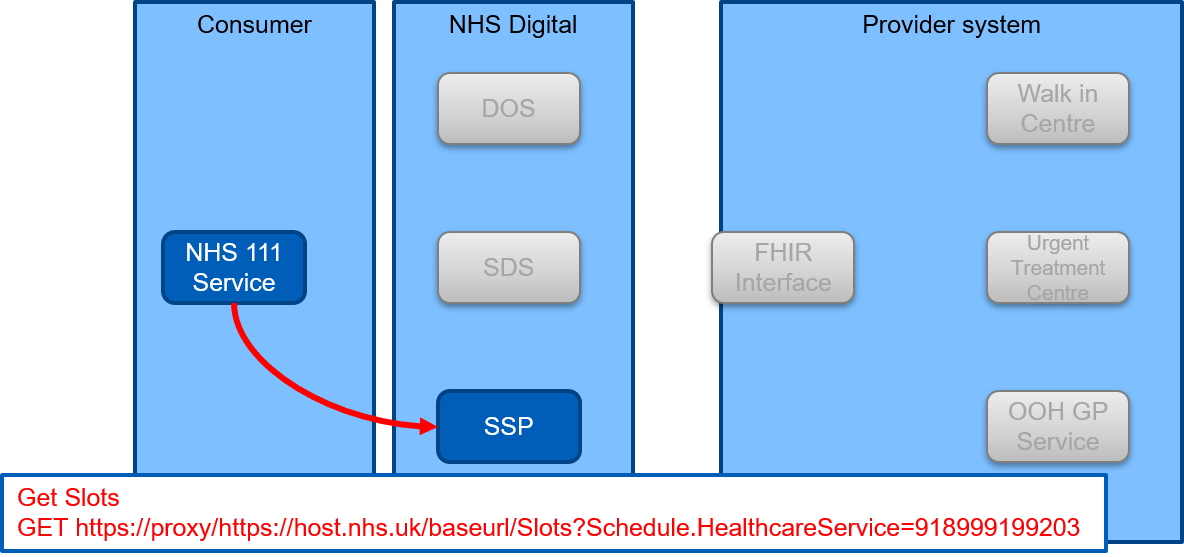
Once the request is made at the SSP, it is passed through to the FHIR endpoint at the provider service.
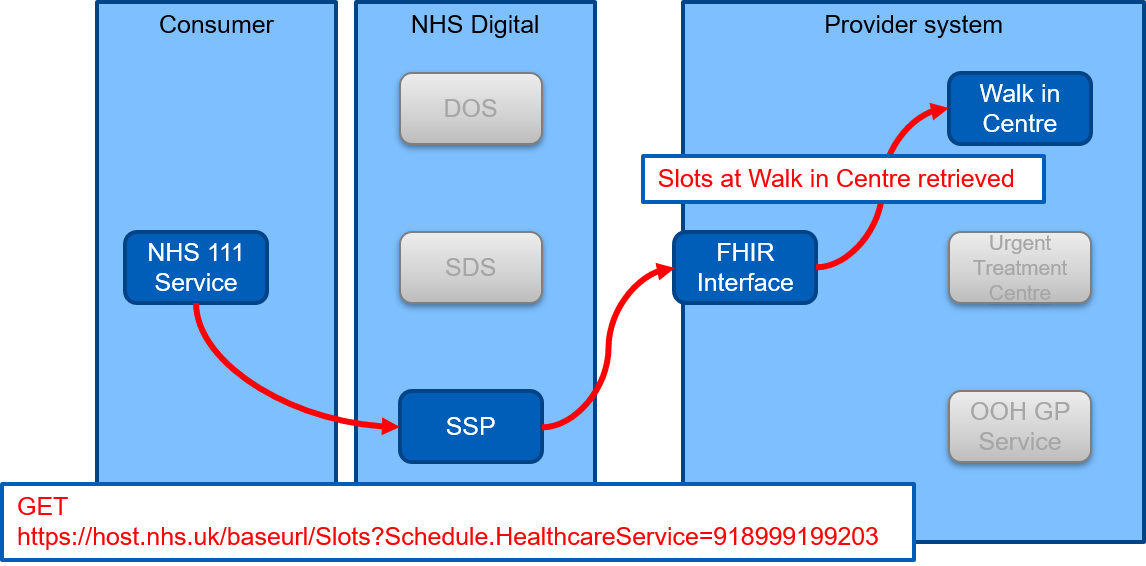
This will return a FHIR slot resource bundle for example:
json
{
"resourceType": "Bundle",
"type": "searchset",
"entry": [
{
"fullUrl": "Schedule/14",
"resource": {
"resourceType": "Schedule",
"id": "14",
"meta": {
"versionId": "1469444400000",
"profile": [
"https://fhir.nhs.uk/STU3/StructureDefinition/NHS-Schedule-1"
]
},
"actor": [
{
"reference": "Location/17"
},
{
"reference": "Practitioner/2"
}
],
"comment": "Schedule 1 for general appointments"
}
},
{
"fullUrl": "Practitioner/2",
"resource": {
"resourceType": "Practitioner",
"id": "2",
"meta": {
"versionId": "636064088099800115",
"profile": [
"https://fhir.nhs.uk/STU3/StructureDefinition/CareConnect-Practitioner-1"
]
},
"identifier": [
{
"system": "https://fhir.nhs.uk/Id/sds-user-id",
"value": "S001"
}
],
"name": {
"family": [ "Black" ],
"given": [ "Sarah" ],
"prefix": [ "Mrs" ]
},
"gender": "female"
}
},
{
"fullUrl": "Slot/1584",
"resource": {
"resourceType": "Slot",
"id": "1584",
"meta": {
"versionId": "1471219260000",
"profile": [
"https://fhir.nhs.uk/STU3/StructureDefinition/NHS-Slot-1"
]
},
"schedule": {
"reference": "Schedule/14"
},
"status": "free",
"start": "2016-08-15T11:30:00.000+01:00",
"end": "2016-08-15T11:59:59.000+01:00"
}
},
{
"fullUrl": "Slot/1644",
"resource": {
"resourceType": "Slot",
"id": "1644",
"meta": {
"versionId": "1471219260112",
"profile": [
"https://fhir.nhs.uk/STU3/StructureDefinition/NHS-Slot-1"
]
},
"schedule": {
"reference": "Schedule/14"
},
"status": "free",
"start": "2016-08-15T12:00:00.000+01:00",
"end": "2016-08-15T12:29:59.000+01:00"
}
}
]
}
Book Appointment
The booking is made following the same process as getting available slots. However this tie a post is made to the SSP with a serialised FHIR appointment resource as the payload.
Using the access token the provider system can:
- Determine the identity of the consuming system.
- Be reassured that the consuming system has gone through the appropriate assurance to request slots and/or book appointments.
- Determine that the consuming system is involved in the provision of direct patient care (rather than for administrative purposes).
- Determine the care setting (e.g. urgent care, routine care Etc) for which the consuming system is requesting slots or booking an appointment.
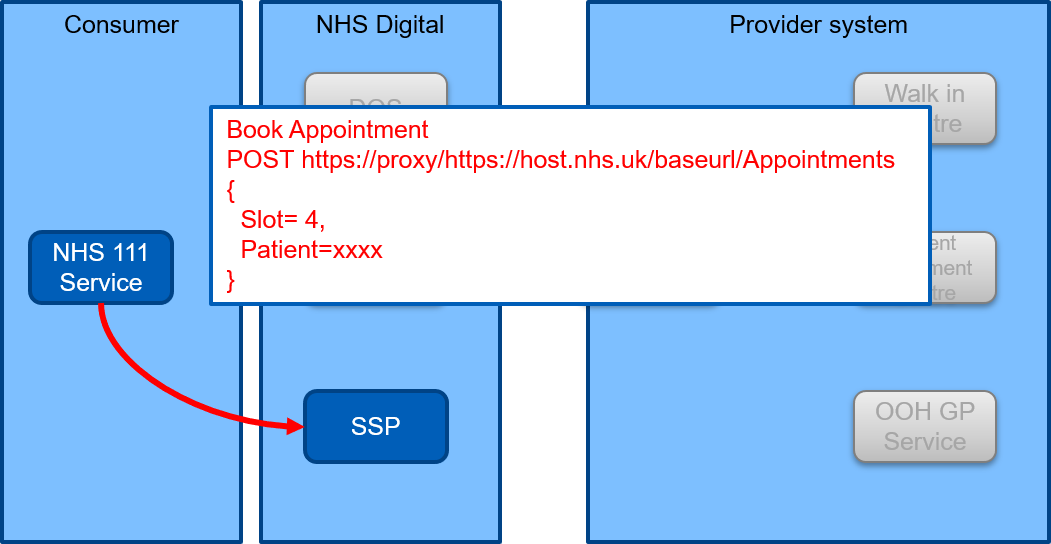
This will be passed through to the provider FHIR endpoint
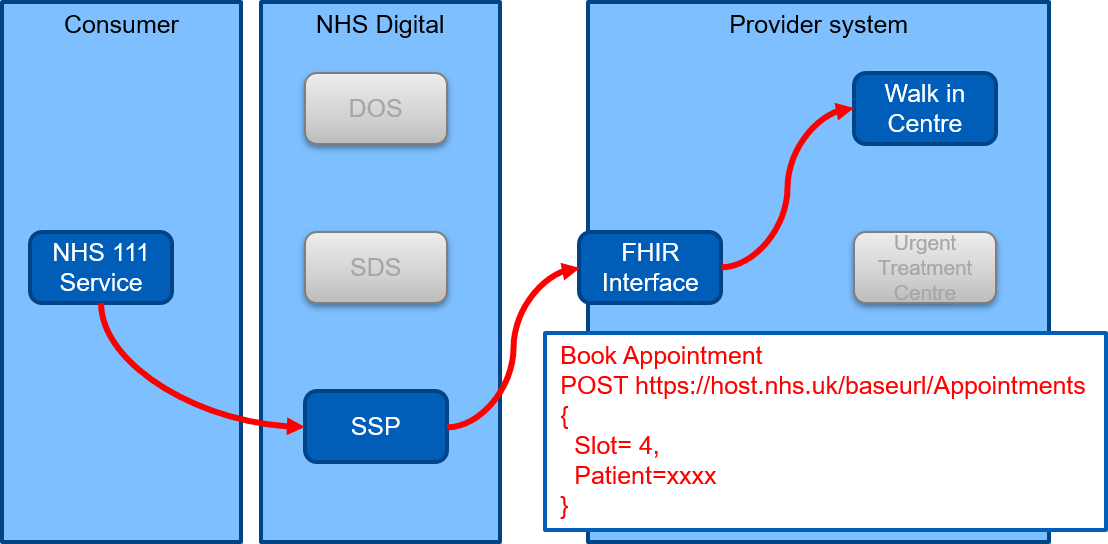
If a booking is successfully created a 201: Created HTTP status code will be returned.
